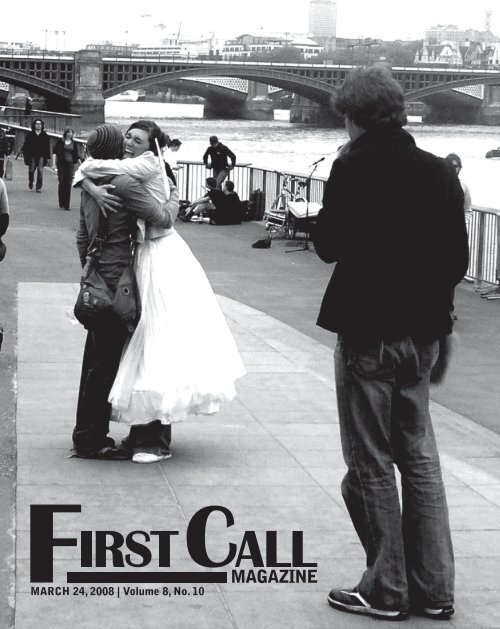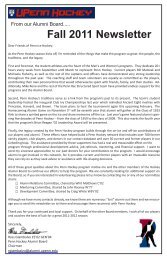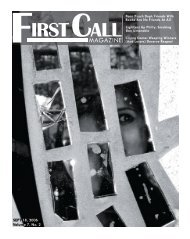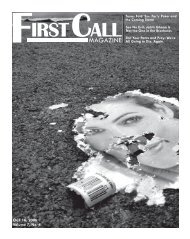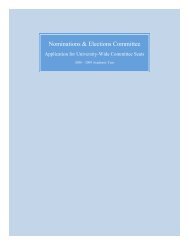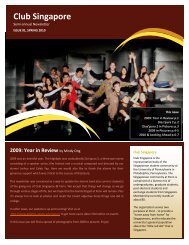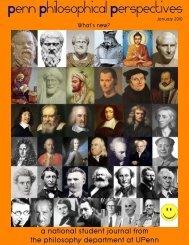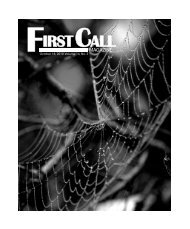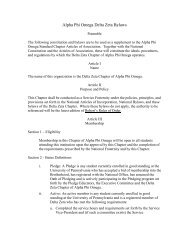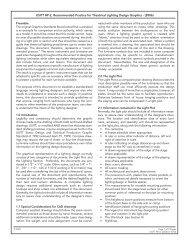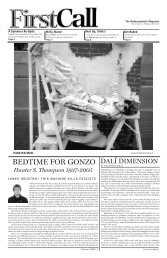MAGAZINE - Dolphin.upenn.edu - University of Pennsylvania
MAGAZINE - Dolphin.upenn.edu - University of Pennsylvania
MAGAZINE - Dolphin.upenn.edu - University of Pennsylvania
Create successful ePaper yourself
Turn your PDF publications into a flip-book with our unique Google optimized e-Paper software.
MARCH 24, 2008 | Volume 8, No. 10<br />
magazine
FIRST<br />
LOOK<br />
9<br />
POLITICAL WOES<br />
Isaac katz<br />
Isaac’s not so sure it even matters who<br />
wins the Democratic nomination.<br />
12<br />
90 MINUTE COMMUTE<br />
michael Sall<br />
Mike spends a summer commuting to<br />
work. He’s not very good at it, though.<br />
4<br />
6<br />
7<br />
11<br />
15<br />
16<br />
sportsfan-101<br />
michael field<br />
Michael would like to bring back creativity to college sports student sections nationwide.<br />
photospotlight: Hallowed halls<br />
Pauline Baniqued<br />
That’s so cliche<br />
one penn dude<br />
One Penn Dude has no qualms with hearing the same things over, and over, and<br />
over again.<br />
photospotlight: spring 2004<br />
Richard Liebowitz<br />
review: saturnalia<br />
Steven Waye<br />
Steven reviews the Gutter Twins’ latest release.<br />
crossword: Words that have z’s in them<br />
The editors<br />
cover: Embrace, sHELBY PRINDAVILLE<br />
Contact<br />
FIRST CALL, Ke l ly Wr i t e r’s Ho u s e<br />
3805 Lo c u s t Wa l k, Ph i l a d e l p h i a, PA 19104<br />
w w w .f i r s t ca l l m a g a z i n e.c o m<br />
f c pa p e r@g m a i l.c o m<br />
Contributors<br />
Ed i to r-in-Ch i e f: Mi c h a e l Sa ll • Ed i to r s: Tim Pot e n s, Be n n y La i t m a n, Er i c a To b i n, Da n De u t s c h • Ch i e f De s i g n<br />
Ed i to r: Ch a r l i e Is a a c s • Ch i e f Ar t Ed i to r: Da n Ma r ko w i t z • We b m a s t e r: Tim Pot e n s • Bu s i n e s s Ma n a g e r: An n a<br />
To l m a c h • Di s t r i bu t i o n Ma n a g e r: Va l er i a Ts y g a n ko va • Tr e a s u r e r: Ra c h a e l Hu t c h i n s o n • Fe at u r e s Ma n a g e r: Kat h y<br />
Wa n g • Re c r u i t m e n t Ma n a g e r: Ri v k a Fo ge l • Ma r k e t i n g Ma n a g e r: Ju n Pa r k • Ar t i s t s: Da n Ma r ko w i t z, Yu e Wu<br />
Co l u m n i s t s: On e Pe n n Du d e • Wr i t e r s: Mi c h a e l Fi e l d, St e v e n Way e, Is a a c Kat z, Mi c h a e l Sa ll<br />
Ph oto g r a p h e r s: Sh e l b y Pr i n d av i ll e, Ri c h a r d Li e b o w i t z, Pa u l i n e Ba n i q ue d<br />
2 FIRST CALL MARCH 24, 2008
LETTER FROM<br />
THE EDITORS<br />
Dear Children <strong>of</strong> Franklin,<br />
You probably missed the news<br />
last week, but Ben would be so proud.<br />
His home town might be getting a<br />
little bit taller. The American Commerce<br />
Center, a super tall skyscraper,<br />
has been proposed to be built in the<br />
city <strong>of</strong> Philadelphia. The preliminary<br />
design by the architectural firm Kohn<br />
Pedersen Fox – the same guys who<br />
designed Huntsman, no less – would<br />
put the tower at 1500 feet tall. As in,<br />
taller than the Empire State Building.<br />
It’s still early in the early stages,<br />
but I don’t know why the city would<br />
ever balk at building a giant middle<br />
finger to New York. Ben really would<br />
be proud.<br />
I’ve written about this before, but<br />
Philly has a massive inferiority complex<br />
when it comes to other cities, especially<br />
New York. Anytime we’re given<br />
the chance to take a jab at New York<br />
– whether building a taller building or<br />
throwing bottles at Mets fans – Philadelphians<br />
will take it, no matter what<br />
the costs. Inserting 1500 feet <strong>of</strong> <strong>of</strong>fice<br />
space in Center City will only worsen<br />
traffic in the city; we’re already at the<br />
national average as Mike tells us. But<br />
a little extra traffic is well worth it if it<br />
gives us another insult to shout at the<br />
Giants when they come to town.<br />
Maybe that’s a little extreme –<br />
Philadelphians aren’t that sportsobsessed<br />
– but it is the cliché after all.<br />
Our anonymous Penn Dude doesn’t<br />
mind clichés too much. We Philadelphians,<br />
both natives and our adopted<br />
brothers and sisters here at Penn,<br />
firstcallism<br />
need to embrace our clichés. Michael<br />
laments the death <strong>of</strong> the “Hey Song”<br />
at the Palestra, and he’s absolutely<br />
right. Without our caustic spectators,<br />
Philadelphia is nothing.<br />
Embracing this spirit <strong>of</strong> Philadelphia<br />
is the key to winning the hearts <strong>of</strong><br />
its people. Ed Rendell is so universally<br />
adored here not because <strong>of</strong> his political<br />
achievements but because <strong>of</strong> how<br />
strongly he embodies that Philadelphia<br />
spirit. In Philadelphia, what Ed<br />
Rendell says, goes – which is why I’m<br />
not expecting the PA primary polls to<br />
change very much. Hillary is in the<br />
lead because she’s been endorsed by<br />
Ed, and no matter how many hordes<br />
<strong>of</strong> college students Barack unleashes<br />
on Philadelphia, that isn’t going to<br />
change. Isaac says the Democratic<br />
Party is dead, but I’m even more cynical<br />
than that. The city and suburbs<br />
<strong>of</strong> Philadelphia, and with them the<br />
<strong>Pennsylvania</strong> primary, are beholden<br />
to a single man whose popularity is<br />
galvanized by his weekly appearances<br />
on the Eagles Postgame show on<br />
Comcast.<br />
It doesn’t matter if you’re a Clintoista,<br />
a McCainiac, or part <strong>of</strong> the<br />
Obamanon: <strong>Pennsylvania</strong>’s in the<br />
bag. It may be a depressing outlook<br />
on things, but real Philadelphians<br />
don’t let that get them down. More<br />
important things are afoot; it’s almost<br />
baseball season.<br />
Yours in Philadelphia,<br />
Tim Potens<br />
Editor<br />
A tip for padding<br />
your resume: 2001 Time<br />
Magazine Person <strong>of</strong> the Year<br />
EDITORIAL<br />
POLICY<br />
Fir s t Ca l l is t h e u n d e r g r a d u a t e<br />
m a g a z i n e o f t h e Un i v e r s i t y o f<br />
Pen n s y l v a n i a p u b l i s h e d e v e ry<br />
o t h e r Mo n d a y . Ou r m i s s i o n<br />
is t o p r o v i d e m e m b e r s o f t h e<br />
c o m m u n i t y a n o p e n f o r u m f o r<br />
e x p r e s s i n g i d e a s a n d o p i n i o n s .<br />
To t h i s e n d , w e , t h e e d i t o r s o f<br />
Fir s t Ca l l, a r e c o m m i t t e d t o a<br />
p o l i c y o f n o t c e n s o r i n g o p i n -<br />
i o n s . Ar t i c l e s a r e p r o v i d e d b y<br />
r e g u l a r c o l u m n i s t s a n d w r i t-<br />
e r s. Th e y a r e c h o s e n f o r p u b -<br />
l i c a t i o n b a s e d o n t h e q u a l i t y<br />
o f writing, a n d , in th e ca s e <strong>of</strong><br />
c o m m e n t a r i e s , t h e q u a l i t y o f<br />
a r g u m e n t a t i o n . Ou t s i d e o f t h e<br />
editorial a n d o t h e r editorial<br />
c o n t e n t , n o a r t i c l e r e p r e s e n t s<br />
t h e o p i n i o n o f Fi r s t Ca l l, i t s<br />
editorial b o a r d, o r i n d i v i d u a l<br />
m e m b e r s o f Fi r s t Ca l l o t h e r<br />
t h a n t h e a u t h o r . No c o n t e n t<br />
in Fi r s t Ca l l u n l e s s o t h e r w i s e<br />
s t a t e d r e p r e s e n t s t h e o f f i c i a l<br />
p o s i t io n o f t h e a d m i n i s t r a -<br />
t i o n , f a c u l t y, o r s t u d e n t b o d y<br />
a t l a r g e o f t h e Un i v e r s i t y o f<br />
Pen n s y l v a n i a .<br />
s u p p o rt e d b y<br />
t h e k e l ly<br />
w r i t e r s<br />
h o u s e<br />
FIRST CALL MARCH 24, 2008 3
sportsfan-101<br />
zen and the art <strong>of</strong> the basketball cheer<br />
Michael Field<br />
It was a bright, hot room. Hundreds<br />
<strong>of</strong> bodies were packed close together,<br />
sweating. All at once they began<br />
throwing condoms and women’s underwear<br />
into the air. No, this wasn’t<br />
one <strong>of</strong> those orgies held on campus I<br />
never seem to get invited to; it was a<br />
basketball game between <strong>University</strong><br />
<strong>of</strong> Maryland and Duke on January 14,<br />
1984.<br />
During player introductions,<br />
when Maryland forward Herman<br />
Veal was introduced, the Cameron<br />
Crazies, Duke’s student section, threw<br />
condoms and panties at him after he<br />
was accused <strong>of</strong> sexual assault by a fellow<br />
Maryland student. Veal had to<br />
endure taunts <strong>of</strong> “Rape,” and he was<br />
greeted with signs reading, “Hey, Herman...<br />
did you send her flowers?” This<br />
“tasteless” display was admonished by<br />
Duke’s coach Mike Krzyzewski and<br />
president Terry Sanford. To make up<br />
for their actions at the next game the<br />
Cameron Crazies sported tinfoil halos,<br />
hung a sign reading A HEARTY<br />
WELCOME TO DEAN SMITH, and<br />
chanted, “We beg to differ,” when they<br />
disagreed with the refs.<br />
Where has this creative streak<br />
gone? Sure, Duke’s fans may have been<br />
a bit out <strong>of</strong> line, but they rebounded<br />
hilariously. Now the only times we<br />
hear about fan behavior in college<br />
basketball are when they threaten to<br />
break the player’s legs (Kevin Love),<br />
kill their families (Eric Gordon), or<br />
rape their sisters (J.J. Redick).<br />
The lack <strong>of</strong> good student cheers<br />
can’t be blamed entirely on the students.<br />
It was our own administration<br />
that recently told our band to stop<br />
playing the “Hey Song” at the end <strong>of</strong><br />
basketball games. We have actively<br />
stopped our student section from being<br />
good fans.<br />
Our student section needs the<br />
help too. I have never seen a worse<br />
Dan Markowitz is a freshman in Engineering. You can write to him at idaniel@seas and visit his website at http://www.defectivity.com.<br />
4 FIRST CALL MARCH 24, 2008
endition <strong>of</strong> the “DE-FENSE” chant<br />
than at Penn home games. It’s bad<br />
enough that our cheerleaders, band,<br />
and student section are all chanting<br />
at slightly different times, but who<br />
decided that the chant is supposed to<br />
speed up until it is a jumbled mess <strong>of</strong><br />
claps and yells?<br />
Worse still, our student section<br />
seems to have embraced the growing<br />
trend <strong>of</strong> throwing homophobic<br />
slurs at the opposition. Come on, I<br />
hate them too, but think <strong>of</strong> something<br />
new. Our student section got especially<br />
rowdy against Harvard when<br />
our Justin Reilly was fouled hard by<br />
Harvard’s center Evan Harris, leading<br />
to the ejections <strong>of</strong> Andreas Schreiber<br />
and Brennan Votel.<br />
All is not lost in the Palestra. At<br />
certain timeout breaks the Red &<br />
Blue Crew unrolls a paper sign bearing<br />
some sort <strong>of</strong> jab at the opponent.<br />
Some <strong>of</strong> my personal favorites this<br />
year were: “We may be having a down<br />
year, but you’re still Dartmouth,” and<br />
“Tyler, you look better in the mask,”<br />
the latter a jab at the face mask North<br />
Carolina forward Tyler Hansbrough<br />
sported last season after breaking his<br />
nose.<br />
In fact, in spite <strong>of</strong> our administration’s<br />
protests, I believe our student<br />
section is one <strong>of</strong> the best in the nation.<br />
Even without the support <strong>of</strong> the band<br />
the student section has been singing<br />
the “Hey Song” a cappella. Instead <strong>of</strong><br />
chanting a fight song ad nauseam like<br />
some schools — I’m looking at you<br />
Notre Dame and Michigan — we still<br />
come up with creative taunts. When<br />
we faced North Carolina at the Palestra,<br />
much <strong>of</strong> our student section held<br />
up pictures <strong>of</strong> Hansbrough’s mother<br />
with the word MILF underneath.<br />
The big problem now is that<br />
March Madness has started, or is already<br />
over depending on when you’re<br />
reading this, and Penn is nowhere to<br />
be found in the bracket. This leaves<br />
the cheering to other schools. While<br />
schools like Duke and Kansas may<br />
have had great fans once, the fan field<br />
has recently evened out. Long ago<br />
was the time when the Cameron Crazies,<br />
the gold standard <strong>of</strong> basketball<br />
fans, had their band play The Who’s<br />
“Pinball Wizard” and threw quarters<br />
at North Carolina St.’s center Tommy<br />
Burleson, who was caught breaking<br />
into pinball machines.<br />
Sure, plenty <strong>of</strong> schools still have<br />
loud fans that give them large home<br />
court advantages, but sheer noise<br />
can’t make up for creativity. It wasn’t<br />
until the Cameron Crazies sat down<br />
and had one <strong>of</strong> their own strip down<br />
to a Speedo and dance that North<br />
Carolina’s free throw shooters began<br />
to miss. And after that game Coach<br />
Krzyzewski “banned” Speedos from<br />
Duke basketball games.<br />
The fact <strong>of</strong> the matter is that the<br />
fans can have a big influence on a basketball<br />
game. Sometimes it’s getting<br />
into a player’s head with a chant and<br />
sometimes it’s throwing a cup at Ron<br />
Artest, starting a brawl between players<br />
and fans at a game at the Palace <strong>of</strong><br />
Auburn Hills a few years ago. While I<br />
agree that behavior is certainly out <strong>of</strong><br />
line, I believe we need to give our fans<br />
a little more wriggle room.<br />
One <strong>of</strong> the reasons people go to<br />
sporting events is to let <strong>of</strong>f steam, and<br />
what better way to do that than jeer<br />
at the opposing players? Let the fans<br />
cheer the way they want; if nothing<br />
else it’s a whole lot <strong>of</strong> fun. FC<br />
Michel Field is a freshman in Wharton.<br />
You can write to him at fieldmb@wharton.<br />
FIRST CALL MARCH 24, 2008 5
PhotoSpotlight:<br />
Hallowed halls, BY pauline baniqued<br />
Pauline is a senior in the College. You can write to her at paulineb@sas.<br />
6 FIRST CALL MARCH 24, 2008
Clichés don’t bother me as much as<br />
the next guy. In high school, and<br />
even college, we are taught that clichés<br />
are bad. Wikipedia tells us that a<br />
cliché is “overused to the point <strong>of</strong> losing<br />
its intended force or novelty, especially<br />
when at some time it was considered<br />
distinctively forceful or novel.<br />
The term is most likely to be used in<br />
a negative context.” (I cite Wikipedia<br />
because I can — no teacher is going<br />
to d<strong>edu</strong>ct points from me here.) I am<br />
not saying that we should use the term<br />
“pretty as a picture” more or that there<br />
should always be an evil twin, but I do<br />
think we shouldn’t discard something<br />
just because we’ve heard it a few times<br />
before.<br />
We all fancy our lives to be different<br />
and unique from everyone else’s;<br />
we were taught at a young age that<br />
we are all “special.” The truth is that<br />
we are not. All lives are generally the<br />
same: we’re born, we have a childhood,<br />
we go to school, we work, we<br />
retire, and then we die. We all get out<br />
<strong>of</strong> bed in the morning and go to sleep<br />
at night; we all brush our teeth, eat,<br />
shower, and shit. Along the way we<br />
have experiences — the experiences<br />
are universal, but they are important<br />
to us. We experience happiness, we<br />
That’s so cliché<br />
But does it really matter?<br />
One Penn Dude: Rambles et Al.<br />
experience loss, we experience love,<br />
and we experience grief. These experiences<br />
have been around forever, but<br />
they never get old.<br />
Looking back to my childhood,<br />
it’s funny to see how people played<br />
along. “Mom, I lost my crayons. I<br />
lost my crayons!” “I’m so sorry, honey.<br />
We’ll get you new crayons tomorrow.”<br />
When we’re little we think everything<br />
is a big deal, and the people around us<br />
indulge us. They agree — it is a big<br />
deal. Now that we’re older, we don’t<br />
get so much sympathy. When someone<br />
breaks up with their boyfriend or<br />
girlfriend it is as if their life is shattered,<br />
but we know it is not. We’ve<br />
seen it time and time again; they’ll<br />
get over it and move on. Even when<br />
someone loses a parent, it breaks our<br />
heart, but we know that their world<br />
will continue. We’ve seen other people<br />
go through the same thing and we’ve<br />
heard other stories — we have pro<strong>of</strong>.<br />
There is a book my mother once<br />
told me about (hi, mom!), but the<br />
name escapes me. It is about the stages<br />
<strong>of</strong> life and how they are similar for<br />
all <strong>of</strong> us. I think the aim <strong>of</strong> the book is<br />
to teach you how to navigate life, but<br />
I am more concerned with the breakdown.<br />
In our teens we all feel insecure,<br />
in our twenties we are afraid <strong>of</strong> growing<br />
up, in our thirties we are scared<br />
that our life is not heading where we<br />
want it to, and so on. I’d imagine that<br />
once we hit sixty we all wonder if the<br />
life we led was one to be proud <strong>of</strong>, and<br />
after that we worry about dying.<br />
My point is this: even though the<br />
same things happen over and over<br />
again, that does not make them insignificant.<br />
If your grandmother moves<br />
into your house because she can no<br />
longer take care <strong>of</strong> herself, if you think<br />
you might be failing out <strong>of</strong> school, or<br />
if your friend just died, I still want to<br />
hear about it. You can talk about it,<br />
make a movie, or write a book; I’ll<br />
listen, watch, or read. Everything<br />
that happens to me is important, so<br />
everything that happens to you must<br />
have meaning. It doesn’t matter if it<br />
sounds “cliché.” Share your story, and<br />
don’t let anyone tell you not to. And if<br />
you’re really stuck, tell me – I’ll listen.<br />
I think my email is in the lower righthand<br />
corner. FC<br />
The author <strong>of</strong> this column wishes to<br />
remain anonymous. You may write to him<br />
at OnePennDude@gmail.<br />
You are cordially invited to the<br />
FIRST CALL MEETING<br />
Tu e s d ay, Ma r. 25t h, 8p m in t h e Ha r n w e l l Up p e r Lo b b y<br />
No RSVP Required<br />
Sincerely, www.firstcallmagazine.com<br />
FIRST CALL MARCH 24, 2008 7
Coupon!<br />
$5 OFF Haircut<br />
(reg. $25-$35)<br />
$10 OFF Highlights<br />
One Coupon Per Customer - Not Valid with any other Specials<br />
SATURN<br />
36th St.<br />
CLUB<br />
Library<br />
Walnut Street<br />
34th St.<br />
Sansom Street<br />
SATURN CLUB<br />
3426 Sansom St<br />
Mon-Fri 10-7 & Sat 10-6<br />
8 FIRST CALL MARCH 24, 2008
O<br />
ver the past<br />
few years, reality<br />
shows on television have become<br />
ever more popular. From the bottom<br />
<strong>of</strong> the barrel (Fear Factor, The Real<br />
World, Big Brother) to competition<br />
shows (American Idol, The Apprentice,<br />
Project Runway) to supposedly<br />
more honorable or charitable fare<br />
(The Biggest Loser, The Big Give,<br />
Extreme Makeover: Home Edition),<br />
reality shows have largely replaced<br />
scripted shows on TV because they<br />
are easy and cheap to produce while<br />
winning sky-high ratings. But reality<br />
shows have nothing on the most dramatic<br />
reality show <strong>of</strong> all: this year’s<br />
Democratic primary.<br />
It almost seems like Hillary Clinton<br />
and Barack Obama were fated to<br />
fight each other. It is the ambitious<br />
woman versus the eloquent black<br />
man, the conniving bitch (as Tina Fey<br />
said on SNL, “Bitch is the new black”)<br />
versus the wordsmith <strong>of</strong> meaningless<br />
platitudes (what does “Yes we can!”<br />
really mean?). However you want to<br />
look at it, the two are equally matched<br />
and increasingly combative. Hillary<br />
has the support <strong>of</strong> old Democrats, the<br />
party faithful, and those still loyal to<br />
the Clinton political machine. Obama<br />
has the support <strong>of</strong> young voters, African<br />
Americans, and those sick <strong>of</strong> the<br />
Bush-Clinton dynamic that could potentially<br />
rule America from 1988 to<br />
2016 – 28 years <strong>of</strong> just two families.<br />
As Obama and Clinton head into<br />
the <strong>Pennsylvania</strong> primary, the campaign<br />
is only getting more heated.<br />
<strong>Pennsylvania</strong> is the biggest <strong>of</strong> the remaining<br />
primaries and still weeks<br />
away (South Dakota and Montana<br />
FIRST CALL MARCH 24, 2008 9
have primaries on June 3, six months<br />
after the original caucuses in Iowa).<br />
Obama has a slight lead in delegates,<br />
a lead seemingly insurmountable<br />
without Clinton turning the tide at<br />
the party convention by convincing<br />
enough “superdelegates” to vote for<br />
her. (A superdelegate is a party big<br />
shot – governors, Congress members,<br />
party leaders – who can vote any way<br />
they want.)<br />
Here is the rub. If superdelegates<br />
turn the tide and elect Clinton as the<br />
Democratic nominee, Obama’s supporters<br />
will be outraged at the subversion<br />
<strong>of</strong> the democratic process<br />
and likely stay home from the general<br />
election. In particular, black voters,<br />
Obama’s most loyal supporters (90%<br />
<strong>of</strong> them voted for Obama in Mississippi,<br />
the most recent primary), will<br />
probably lose all faith in the process,<br />
as well they should, and choose not<br />
to vote against John McCain. On the<br />
age over the time between the Civil<br />
War and the early twentieth century,<br />
positioning itself against the big cats<br />
and having a stronghold among poor<br />
Southern voters disenchanted with<br />
big industry. Franklin D. Roosevelt is<br />
surely the best example <strong>of</strong> this part <strong>of</strong><br />
the Democratic Party, elected to fight<br />
the Great Depression and passing the<br />
New Deal to help the common worker.<br />
The Southern base was lost in the sixties,<br />
when Lyndon B. Johnson and the<br />
Democrats supported the Civil Rights<br />
Act <strong>of</strong> 1964. Today, the party base is<br />
entirely in the Northeast, with much<br />
<strong>of</strong> it comprised <strong>of</strong> well-<strong>of</strong>f liberals uncomfortable<br />
with evangelicalism and<br />
megachurches.<br />
But during George W. Bush’s<br />
terms as President, the Democrats<br />
have laid down and accepted everything<br />
thrown their way. Already<br />
weakened – since John F. Kennedy’s<br />
assassination in 1963, Republicans<br />
the Taliban), Americans <strong>of</strong>fered large<br />
bounties for terrorists. Needless to say,<br />
many innocent people were picked up<br />
and transmitted to Gitmo in exchange<br />
for American money.<br />
The triumph <strong>of</strong> the American legal<br />
system – due process and the rule <strong>of</strong><br />
law – has been, shockingly, abandoned<br />
at Gitmo. Prisoners are held without<br />
being charged with crimes, without<br />
recourse to defend themselves, without<br />
access to the evidence presented at<br />
the “tribunals” (what a word! It calls<br />
to mind Soviet Russia more than anything)<br />
they are given, and without access<br />
to the Koran for prayer. They are<br />
allegedly being tortured according to<br />
human rights groups, and they are increasingly<br />
attempting suicide. Worst<br />
<strong>of</strong> all, American attempts to criticize<br />
countries like China for their human<br />
rights <strong>of</strong>fenses such as torture are absurd<br />
and laughable now that America<br />
itself has refused to ban torture itself.<br />
I think the end <strong>of</strong><br />
the Democratic Party<br />
would be a fantastic thing.<br />
other hand, if the superdelegates stick<br />
with Obama, women voters will grow<br />
disenchanted with losing the seemingly<br />
one chance for a female president<br />
and also stay home. Either way,<br />
the Democratic nominee, at one point<br />
an apparent shoo-in against an immensely<br />
unpopular Republican party,<br />
will have a big strike against him or<br />
herself.<br />
This may be stretching the issue,<br />
perhaps, but the controversy over the<br />
Democratic nomination (not just the<br />
superdelegates, but Michigan and<br />
Florida as well) could go a long way<br />
to destroying the Democratic Party.<br />
This is the point I want to get to, and<br />
it is why I spent four paragraphs summarizing<br />
the situation <strong>of</strong> which many<br />
<strong>of</strong> you may already be aware. And I<br />
think the end <strong>of</strong> the Democratic Party<br />
would be a fantastic thing.<br />
The Democratic Party came <strong>of</strong><br />
10 FIRST CALL MARCH 24, 2008<br />
have held the White House for almost<br />
two-thirds <strong>of</strong> the forty-five years – the<br />
Democrats have failed to do anything<br />
to check Bush’s historically increasing<br />
powers. The war in Iraq was based on<br />
the premise that Saddam Hussein was<br />
developing weapons <strong>of</strong> mass destruction;<br />
he had stopped those programs<br />
in the mid-nineties. Either Bush knew<br />
that, in which case he’s a war-monger,<br />
or he didn’t know that, in which case<br />
he’s incompetent. But in either case,<br />
the Democrats allowed this unnecessary<br />
war to go through without significant<br />
opposition.<br />
Even worse, they have failed to do<br />
anything about Guantanamo Bay and<br />
other human rights <strong>of</strong>fenses perpetrated<br />
by Americans during the course<br />
<strong>of</strong> the war on terror. After the war in<br />
Afghanistan (a real war – one that it<br />
is progressively failing as the focus on<br />
Iraq has led to a quiet resurgence <strong>of</strong><br />
All this has been extensively documented<br />
– no need to list all the rights<br />
lost under the Patriot Act, the Federal<br />
Intelligence Surveillance Act, and on<br />
and on – but the Democratic Party<br />
has done nothing to stop it. With<br />
the Democrats beating each other to<br />
pieces, McCain seems increasingly<br />
likely to win the general election, and<br />
he has, if anything, even more hardlined<br />
stances about such issues than<br />
Bush does. What America needs is<br />
a new political party, one willing to<br />
stand up against the abuse <strong>of</strong> human<br />
rights against detainees and others as<br />
well as one both willing and able to<br />
fight against the Republican party’s<br />
increasing domination <strong>of</strong> the political<br />
sphere. I am not optimistic. FC<br />
Isaac Katz is a junior in the College.<br />
You can write to him at isaachk@sas.
Photo Spotlight:<br />
Spring 2004, BY Richard LIEBOWITZ<br />
Richard Liebowitz is a sophomore in the College. You can write to him at liebowit@sas.<br />
FIRST CALL MARCH 24, 2008 11
We all have those personal occasions<br />
we look back on fondly<br />
with a cringe and shudder. I remember,<br />
for example, when I was walking<br />
home from work over the summer<br />
and this fairly large man was about<br />
to walk into me; he was clearly in my<br />
way, on the wrong side <strong>of</strong> the sidewalk,<br />
and I refused to move to the side<br />
– out <strong>of</strong> principle. It was like a game<br />
<strong>of</strong> chicken, but I was in the right. So<br />
when he hit me, and he did, I looked<br />
at him with a pointed glare – only<br />
to see he was blind. Then the bright<br />
orange jacket his dog was wearing<br />
made much more sense. As well as his<br />
cane. And the fact that, without looking<br />
both ways, he had just crossed a<br />
dangerous intersection long after the<br />
blinking red hand had stopped blinking.<br />
I still wince every time I think<br />
about it.<br />
In fact, come to think <strong>of</strong> it, I made<br />
a possibly more shameful mistake,<br />
also on my way home from work, that<br />
I probably shouldn’t admit to in public.<br />
But I will anyway, since this time<br />
it was different. A 76-or-so-year-old<br />
woman saw me a long way <strong>of</strong>f rushing<br />
up the steps to the subway. I was clearly,<br />
visibly, in a frantic rush to catch<br />
the train, and this time she wasn’t<br />
blind. And I really only brushed her<br />
elbow. And there was absolutely no<br />
reason for her to cry out “Owwww!” so<br />
loudly. I mean, she was on the wrong<br />
side <strong>of</strong> the stairs. And it’s not like I<br />
shoved her. Actually, I didn’t really do<br />
anything wrong at all. Why should I<br />
be ashamed that some whiney old<br />
hag tried to pull the ‘senior’ sympathy<br />
card? And she definitely didn’t have to<br />
give me that nasty, moaning, certainly-contrived-to-make-me-feel-bad<br />
glare. Damn it, if that cranky bitch—<br />
Okay, I just winced again. I may<br />
have basically slide-tackled a frail old<br />
woman without feeling guilty. But how<br />
could that happen? Who am I? How<br />
did I become such a MONSTER?<br />
Well, clearly, it’s a result <strong>of</strong> the<br />
deterioration <strong>of</strong> the easy American<br />
commute. Yes, that’s right, this article<br />
12 FIRST CALL MARCH 24, 2008<br />
90 minute commute<br />
the ins and outs <strong>of</strong> getting to work<br />
Michael sall<br />
is not actually about self-deprecation.<br />
As easy as it may be to assume the<br />
blame for my own actions, I can’t ignore<br />
the truth: both <strong>of</strong> those incidents<br />
occurred during my commute home<br />
from work. So really, this isn’t about<br />
me. This isn’t even about mistakes<br />
(which weren’t mistakes). This is about<br />
something much, much bigger. This is<br />
about our nation, about hard-working<br />
Americans, and about how such hard<br />
workers must get home each day after<br />
working so hard. With my own eyes<br />
and bruises I have witnessed just another<br />
example <strong>of</strong> the goings-to-hell <strong>of</strong><br />
our society. We’re doomed.<br />
And the Transportation Research<br />
Board <strong>of</strong> the National Academies<br />
agrees with me, more or less. According<br />
to their “Commuting in America<br />
III” report, published in 2006, the<br />
average American spends 51 minutes<br />
roundtrip commuting to and from<br />
work. Think about that for a second.<br />
That amounts to nearly 9 whole days<br />
each year, all devoted merely to getting<br />
to work and back. That would<br />
be like spending your entire spring<br />
break, morning and night, just riding<br />
on a jam-packed subway or driving in<br />
rush-hour traffic. Every year, until you<br />
retire. And that’s the average.<br />
Even worse, over 10 million<br />
Americans had roundtrip commutes<br />
<strong>of</strong> more than 2 hours, and a third <strong>of</strong><br />
those had commutes <strong>of</strong> more than 3<br />
hours. That’s an incredible amount<br />
<strong>of</strong> time to spend simply on the road<br />
between home and work, especially<br />
when you have another 8 hours—not<br />
including lunch, <strong>of</strong> course—<strong>of</strong> actually<br />
working on top <strong>of</strong> it.<br />
And it’s not like our commutes<br />
are getting any shorter. In fact, it’s the<br />
opposite. In 1980, the average roundtrip<br />
commute was 43.4 minutes. It increased<br />
only 1.4 minutes over the next<br />
decade to 44.8 minutes in 1990. And<br />
by 2000, we’re at 51, an increase for<br />
the decade <strong>of</strong> 6.2 minutes (the report<br />
is based on data for the year 2000).<br />
That’s pretty much exponential.<br />
Actually, that’s not quite true,<br />
since the report acknowledges a bias<br />
in the 1990 data, requiring an adjustment.<br />
But if not exponential, the adjusted<br />
results are still very much linear<br />
in growth. Based on those 3 (statistically<br />
significant, <strong>of</strong> course…) data<br />
points, it looks like our commutes are<br />
growing at a rate <strong>of</strong> almost 2 minutes<br />
every five years. Wow! Good heavens!<br />
Ok, I admit that wasn’t quite as dramatic<br />
as I had hoped. Let me try rephrasing<br />
for greater impact: every five<br />
years, we add another 8 hours to our<br />
annual commuting times. Extrapolating<br />
enormously here, after 15 years,<br />
we’re just giving away another day.<br />
Now, that does kind <strong>of</strong> suck.<br />
But I should stop playing with the<br />
numbers like that (I really hope there<br />
aren’t any statisticians reading this)<br />
because the data alone, without any<br />
inappropriate regressions, are alarming<br />
enough. The fact remains that today,<br />
I’m averaging a 5 minute walk to<br />
class—or a 10 minute total commute,<br />
if you can call it that—and the rest <strong>of</strong><br />
America is doing 51. And “commute”<br />
is only defined as the roundtrip travel<br />
time between home and work. It<br />
doesn’t include hitting the snooze button<br />
four times, then taking a shower,<br />
then getting dressed, then eating<br />
breakfast, then finding your keys,<br />
then finally leaving your place before<br />
running back inside to grab that last<br />
thing you always forget. It probably<br />
does include stopping to a get a cup <strong>of</strong><br />
c<strong>of</strong>fee on the way, but still, when are<br />
these people waking up?<br />
The report doesn’t say, but the<br />
wise reader might ask when Americans<br />
are beginning these ridiculous<br />
commutes, and the report does have<br />
an answer to that. As expected, the<br />
peak start times are between 6:00 am<br />
and 9:00 am, with 64% <strong>of</strong> workers<br />
falling in this range. But here is where<br />
I’m completely shocked: over 11% <strong>of</strong><br />
workers have to start their commutes<br />
before 6:00 am. 6:00 am! And they’re<br />
merely walking out <strong>of</strong> their doors, fully<br />
dressed and ready to go, by this time.<br />
I thought 9:00 am classes were bad,<br />
but 11% <strong>of</strong> all American workers are<br />
probably waking up before many <strong>of</strong> us
are even going to bed. Moreover, that<br />
figure compares with maybe 9% <strong>of</strong><br />
workers leaving by 6:00 am in 1990<br />
(that being my best calculation based<br />
on some confusing, indirect data<br />
provided by the report), so naturally<br />
things are only getting worse.<br />
And what kind <strong>of</strong> article would<br />
this be without some international<br />
comparative statistics to show just<br />
how bad we really have it? While<br />
Americans are averaging 51 minutes,<br />
Germans are averaging 44, the<br />
French are at 36, the Spanish have<br />
33, and Italians are enjoying a mere<br />
23, all roundtrip. In fact, the entire<br />
European Union is averaging just 38<br />
minutes. (The source for this data, if it<br />
interests you, has an impressively long<br />
name: The Fourth European Working<br />
Conditions Survey by the European<br />
Foundation for the Improvement <strong>of</strong><br />
Living and Working Conditions, or as<br />
I like to call it, the FEWCSEFILWC.)<br />
We can at least take some relief in<br />
the fact that we’re not alone – the UK<br />
has it 3 minutes rougher than us with<br />
an average 54 minutes, according to<br />
the RAC Foundation. But that’s just<br />
because more <strong>of</strong> them use public transit<br />
– specifically, about 14% <strong>of</strong> workers<br />
in the UK take the bus or rail (the oneway<br />
travel times <strong>of</strong> which can average<br />
between 36 and 61 minutes) whereas<br />
only about 4.5% <strong>of</strong> Americans do so.<br />
Still, as a recent New Yorker article<br />
published, workers in Japan<br />
commute for an average 90 minutes<br />
each day. And in Bangkok, one <strong>of</strong> the<br />
worst cities in the world for commuting,<br />
citizens are averaging two hours<br />
each day. Well, that does make me feel<br />
a little better, actually.<br />
You would think, though, that<br />
with the advent <strong>of</strong> technology and<br />
computers and everything else, these<br />
numbers would instead be improving.<br />
We have better cars, better forms<br />
<strong>of</strong> public transportation (SEPTA isn’t<br />
getting any worse), and even better<br />
traffic control systems. We have all the<br />
accessible information we could need,<br />
with GPS displays in our cars and<br />
Blackberries in our pockets. I would<br />
think every one <strong>of</strong> these things would<br />
be working in our favor.<br />
Plus, with the internet and the<br />
rest <strong>of</strong> improvements in communication,<br />
more Americans are working at<br />
home (in fact, 4.1 million Americans<br />
did so in 2000, versus 3.4 million in<br />
1990, and only 2.1 in 1980), so these<br />
people don’t even need to commute…<br />
every little bit helps, right? Why, then,<br />
are things getting worse? Why are<br />
commutes getting longer? Why do<br />
Americans have to leave for work so<br />
much earlier?<br />
Well, there are plenty <strong>of</strong> good ex-<br />
FIRST CALL MARCH 24, 2008 13
Submit<br />
your<br />
photos<br />
and<br />
writing<br />
to<br />
fcpaper@<br />
gmail.com<br />
14 FIRST CALL MARCH 24, 2008<br />
planations. As “Commuting in America<br />
III” suggests, some <strong>of</strong> this is due to a<br />
trend <strong>of</strong> Americans seeking to simply<br />
avoid the rush hour, with more and<br />
more workers beginning their commutes<br />
before 6:00 am or after 9:00<br />
am (the 64% <strong>of</strong> working Americans<br />
falling in this range was 67% a decade<br />
before). Some <strong>of</strong> it is also due to an<br />
interesting movement where many<br />
Americans are starting to live in cities<br />
and work in the suburbs, rather than<br />
the other way around. Then there is<br />
always population growth, another<br />
decent explanation, and with that<br />
comes the issue <strong>of</strong> traffic.<br />
Traffic, actually, is a rather good<br />
explanation, and it’s easy to complain<br />
about. The Texas Transportation Institute<br />
produces an annual “Urban<br />
Mobility” report that measures all the<br />
extra time we have to spend in traffic –<br />
that is, the additional time we spend<br />
on the road solely due to congestion.<br />
For the “average peak period traveler”<br />
(so, only looking at workers driving<br />
during rush-hour) in 2007, this added<br />
up to an extra 38 hours <strong>of</strong> traveling<br />
each year. That’s over one and a half<br />
days, above and beyond usual travel<br />
times, just because <strong>of</strong> traffic. They<br />
also went a step further and calculated<br />
how much it cost us: 26 extra<br />
gallons in fuel, adding up to $710 per<br />
traveler in 2007. To determine these<br />
figures, the study looked at 437 specific<br />
U.S. urban areas that ranged in<br />
population. If you just look at those<br />
areas with populations <strong>of</strong> more than 3<br />
million, that figure jumps to 54 hours.<br />
Among them, the Philadelphia urban<br />
area retains the national average <strong>of</strong> 38<br />
hours. Based on this national figure,<br />
that’s still adding another 9 minutes<br />
to the daily commute <strong>of</strong> drivers.<br />
For whatever reason things are<br />
getting worse, though, it’s worth questioning<br />
why we are accepting it. Don’t<br />
we care? Couldn’t we take a closer job,<br />
or if not, at least move closer to work?<br />
We have people in the cities working in<br />
the suburbs and people in the suburbs<br />
working in the cities – that makes no<br />
sense. Why don’t they switch homes?<br />
Or jobs?<br />
The best explanation I’ve read,<br />
honestly, is that people are just, kind<br />
<strong>of</strong>… too dumb to notice. A little while<br />
ago, economists Bruno Frey and<br />
Alois Stutzer <strong>of</strong> the <strong>University</strong> <strong>of</strong> Zurich<br />
published a report titled “Stress<br />
That Doesn’t Pay: The Commuting<br />
Paradox.” It was a psychological study<br />
seeking to determine how people value<br />
their commutes relative to compensation.<br />
The results showed that, if you<br />
were to increase your commute time<br />
from zero to an hour each way, your<br />
salary would have to increase by 40%<br />
to satisfyingly make up for it. That implies<br />
that those who commute should<br />
be receiving significantly more compensation<br />
than those who don’t, but<br />
this simply isn’t happening. Hence<br />
the “Commuting Paradox”: people are<br />
commuting even though it’s terrible.<br />
They’re simply not realizing they need<br />
to be paid more for the unhappiness<br />
<strong>of</strong> it.<br />
Now, there may be plenty <strong>of</strong> other<br />
good explanations, but already I’ve<br />
provided an abundance <strong>of</strong> statistics,<br />
and you’re probably wondering exactly<br />
what my point is. You could be<br />
thinking I want to encourage my fellow<br />
Americans to recognize their nonsensical<br />
habits <strong>of</strong> commuting. Maybe<br />
I want everyone to take a closer look at<br />
their situation and decide if their own<br />
commutes are really worth it. Maybe<br />
I have some great ambitious plans to<br />
fix traffic, commuting times, and early<br />
wake-ups. Maybe I’m trying to warn<br />
the rest <strong>of</strong> the student population<br />
about life after school. Or maybe I just<br />
get some sick pleasure out <strong>of</strong> alarming<br />
anyone who will listen about the<br />
inevitable impending doom!<br />
Well, if you were supposing any<br />
<strong>of</strong> those things, you were wrong. Really,<br />
this is all one big elaborate rationalization<br />
for those two previously<br />
described incidents that took place<br />
during my own commutes home from<br />
work. Clearly, in the horrible times we<br />
are suffering, these things are bound<br />
to happen. My commute at the time<br />
was far above average, 90 minutes<br />
each way. Of course I’m going to be in<br />
a rush, and it’s just common courtesy<br />
to give me more space. So the next<br />
time some old lady gets in my way, I’ll<br />
tell her, “Sorry, times have changed.<br />
Now move it.” And as for that blind<br />
man – well, okay, maybe I still don’t<br />
have much <strong>of</strong> an excuse there. If you’re<br />
reading this, sorry about that. FC<br />
Michael Sall is a junior<br />
in Wharton and the College.<br />
You can write to him at sallms@wharton.
Review: saturnalia<br />
A Reach towards the light for a match made in hell<br />
Steven Waye<br />
The privilege <strong>of</strong> writing a piece on<br />
The Gutter Twins’ Saturnalia is,<br />
for me, the critical equivalent <strong>of</strong> handing<br />
out a lifetime achievement award.<br />
The aptly named Gutter Twins, Mark<br />
Lanegan and Greg Dulli, have toiled<br />
in parallel obscurity for a decade and<br />
a half, cranking out some <strong>of</strong> the most<br />
inventive and visceral music from that<br />
period. Dulli’s quartet Afghan Whigs,<br />
described by Rolling Stone as spending<br />
“the bulk <strong>of</strong> their career on the<br />
brink <strong>of</strong> stardom,” and Lanegan’s band<br />
Screaming Trees, the forgotten sons <strong>of</strong><br />
the Seattle grunge scene, are shunted<br />
aside in discussions about<br />
the greatest rock<br />
acts <strong>of</strong> the<br />
90’s. To this<br />
day they are<br />
prohibitively<br />
overshadowed<br />
by bands like<br />
Soundgarden,<br />
Pearl Jam, and<br />
Alice in Chains,<br />
despite producing<br />
catalogues that<br />
have aged as well<br />
or better than their<br />
c o n t e m p o raries.<br />
They are the neglected<br />
younger brothers<br />
<strong>of</strong> jaded flannel rock,<br />
the Kevin Dillons <strong>of</strong><br />
the alternative scene.<br />
However, in my<br />
eyes these are two <strong>of</strong><br />
the greatest frontmen<br />
<strong>of</strong> their era, and the longevity<br />
<strong>of</strong> their careers, if<br />
nothing else, supports my<br />
claim. They have managed<br />
admirably to con- t i n u e<br />
to make compelling music leading up<br />
to this 2008 release without tragically<br />
self-destructing (Layne Staley,<br />
Kurt Cobain) or becoming a flickering<br />
echo <strong>of</strong> their own fading stars (Chris<br />
Cornell, Eddie Vedder). While admittedly<br />
uneven, Saturnalia highlights<br />
the complimentary creative prowess<br />
<strong>of</strong> two backburner legends in the twilight<br />
<strong>of</strong> their careers, and when Lanegan’s<br />
smoky growl tangos with Dulli’s<br />
fire-breathing wail, the result is some<br />
truly stunning black magic.<br />
The opening track, “The Stations,”<br />
sets the tone, with Lanegan crooning,<br />
“O mama, ain’t no time to fall to pieces,”<br />
with every ounce <strong>of</strong> bitterness his<br />
pack-a-day baritone can muster. The<br />
guitars and strings wail in the background<br />
as Dulli joins Lanegan for the<br />
chorus, lamenting a salvation that<br />
for them only serves as a consistent<br />
reminder <strong>of</strong> what they always<br />
pined for but never<br />
tasted:<br />
“They<br />
say the rapture’s coming/<br />
they say he’ll be here soon/right now<br />
there’s demons crawling all around<br />
my room/They say he lives within us/<br />
They say for me he died/And now I<br />
hear his footsteps almost every night.”<br />
Throughout the album, the musical<br />
accompaniment serves only as<br />
an atmospheric backdrop to two men<br />
struggling to make sense <strong>of</strong> a life <strong>of</strong><br />
burgeoning disappointment, as a<br />
movie score might serve to heighten<br />
the emotional intensity <strong>of</strong> a tragic<br />
dialogue. Yet, strangely, Saturnalia<br />
finds Dulli and Lanegan closer to anything<br />
resembling peace than we have<br />
ever heard in any <strong>of</strong> their previous<br />
endeavors. The tension and scrappiness<br />
that defined their output to this<br />
point is still there, but the interplay<br />
between Dulli and Lanegan reveals a<br />
ruggedly beautiful synchronicity that<br />
led Dulli to dub them “the Satanic<br />
Everly Brothers.” “We had to become<br />
the Gutter Twins because that’s how<br />
we were perceived,” Dulli quips. This<br />
album captures the sound <strong>of</strong> two<br />
weathered men working together in<br />
world-weary harmony, a kinship <strong>of</strong><br />
the kicked-around.<br />
Though Saturnalia recycles<br />
many <strong>of</strong> its best moments, it has<br />
plenty <strong>of</strong> them. “The Body” is an<br />
ethereal ballad that sounds like<br />
something “Adore”-era Billy Corgan<br />
may have penned if he had<br />
the vocal chops to pull it <strong>of</strong>f.<br />
Martina Topley-Bird’s guest<br />
vocals make the song really<br />
take <strong>of</strong>f and transport the listener.<br />
“Who Will Lead Us”<br />
is a hauntingly dark gospeltinged<br />
ballad that showcases<br />
Lanegan’s more wistful<br />
side. “Idle Hands” sounds<br />
like a dance party in Hades,<br />
and you can also hear<br />
the ground shaking as<br />
Lanegan croaks “With<br />
idle hands/there’s nothing<br />
I can do/but be the<br />
Devil’s plaything, baby/and<br />
know that I’ve been used.” When<br />
Dulli accompanies him for the chorus,<br />
it scares the bejeezus out <strong>of</strong> me in the<br />
most beautiful way imaginable.<br />
“Heaven, it’s quite a climb…”<br />
reads the epigraph to the bio section<br />
on the band’s website, a line lifted<br />
from the Saturnalia track “Seven Stories<br />
Underground.” Here’s to hoping<br />
the duo’s ascent continues on for a few<br />
more rungs, and that they keep dragging<br />
us up along with them. FC<br />
Steven Waye is a sophomore in the College.<br />
You can write to him at waye@sas.<br />
FIRST CALL MARCH 24, 2008 15
words that have z’s in them<br />
ACROSS<br />
1. “Wild and ___ Kids” hit 90s<br />
TV show.<br />
3. Funny hat, or a city in Morocco.<br />
7. Russian monarch.<br />
8. United States-based chain<br />
restaurant famous for all-youcan<br />
eat fried shrimp.<br />
9. Polling company.<br />
13. White wine.<br />
14. Island where the Z in Tanzania<br />
comes from.<br />
16. Energy, vitality, vigor, spirit<br />
fingers, 4 z’s.<br />
19. “For sure,” as spoken by<br />
Snoop Dog.<br />
22. The only state that fits the<br />
puzzle.<br />
23. Referee <strong>of</strong> the animal<br />
kingdom.<br />
26. Definitely not straight.<br />
27. And the art <strong>of</strong> motercycles.<br />
28. Find your way out.<br />
DOWN<br />
2. YKK mystery. (Solved: just a<br />
Japanese company.)<br />
4. Don Diego de la Vega<br />
5. Incredible.<br />
6. Weather-based Dairy Queen<br />
product.<br />
10. Not quite drunk.<br />
11. An intermediate floor between<br />
main floors <strong>of</strong> a building.<br />
from.<br />
Visit our online home at<br />
WWW.FIRSTCALL<strong>MAGAZINE</strong>.COM<br />
22 23 The Referee only <strong>of</strong> state the that animal fits kingdom.<br />
the puzzle.<br />
15 17 Alcohol, Type <strong>of</strong> sign, all kinds.<br />
found in stars.<br />
and 27 post And the art your <strong>of</strong> motercycles. comments. So we strip feel club. popular.<br />
16 FIRST CALL MARCH 24, 2008<br />
7<br />
18<br />
22<br />
3<br />
28<br />
1<br />
Across 17. Type <strong>of</strong> sign, found in stars.<br />
Wild and ___ Kids – hit 90s TV show.<br />
3 Funny hat, or a closed-down city in Morocco. strip club.<br />
7 Russian monarch. 20. Like an eggplant, but not.<br />
8 United States-based chain restaurant<br />
famous for all-you-can eat fried shrimp.<br />
9 Polling company.<br />
13 White wine.<br />
14 Island where the Z in Tanzania comes<br />
12. Psychological condition<br />
resulting from the frequent act<br />
<strong>of</strong> turning in a circle.<br />
14. Like a blimp, but explosive.<br />
15. Alcohol, all kinds.<br />
16 Energy, vitality, vigor, spirit fingers, 4 z’s.<br />
19 “For sure,” as spoken by Snoop Dog.<br />
26 Definitely not straight.<br />
28 Find your way out.<br />
9<br />
14<br />
26<br />
4<br />
25<br />
18. Like a witch, but not. Also a<br />
21. He swings on a rope and screams<br />
10<br />
21<br />
15<br />
8<br />
6<br />
13<br />
23<br />
1<br />
5<br />
24<br />
19<br />
17<br />
2<br />
16<br />
11<br />
27<br />
for no Down apparent reason.<br />
223. YKK Legendary conspiracy. Nintendo (Actually, game. just a Japa<br />
24. company.)<br />
Famous clown.<br />
425. Don Always Diego with pepperoni. de la Vega<br />
5 Incredible.<br />
6 Weather-based Dairy Queen product.<br />
10 Not quite drunk.<br />
11 An intermediate floor between main fl<br />
a building.<br />
12 Psychological condition resulting from<br />
frequent act <strong>of</strong> turning in a circle.<br />
14 Like a blimp, but explosive.<br />
18 Like a witch, but not. Also a closed-do<br />
20 Like an eggplant, but not.<br />
21 He swings on a rope and screams for<br />
apparent reason.<br />
23 Legendary Nintendo game.<br />
24 Famous clown.<br />
25 Always with pepperoni.<br />
20<br />
12


